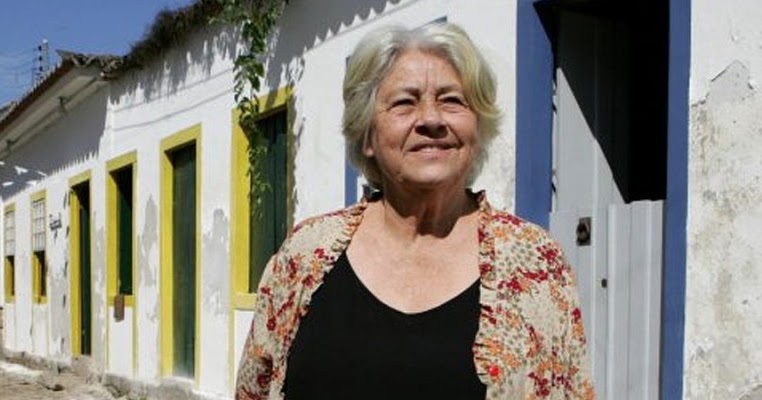
Adélia Luzia Prado de Freitas (Adélia Prado) was born and has lived all her life in the provincial, industrial city of Divinópolis, in Minas Gerais (General Mines), the state that has produced more presidents and poets than any other in Brazil. She was the only one in her family of laborers to see the ocean, to go to college, or to dream of writing a book. She attended the University of Divinópolis, earning degrees in Philosophy and Religious Education, and taught school until 1979. From 1983-1988 she served as Cultural Liaison for the City of Divinópolis. Prado is married to José de Freitas, and has five grown children.
A private writer and daydreamer since she was a girl, it was not until she was neatly forty that Prado began to think she might be writing something worthy of being called ‘literature,’ and sent a small sheaf of work off to poet and critic Affonso Romano de Sant’Anna. Sant’Anna, in turn, passed the poems along to Brazil’s great modernist, Carlos Drummond de Andrade, who pronounced them “phenomenal,” and hand-delivered them to his editor. Drummond subsequently announced in a newspaper column that St. Francis was dictating verses to a housewife in Minas Gerais, and her literary career was launched. Bagagem, her debut collection, was released soon after, followed by seven subsequent volumes of poetry, and seven of prose.
Despite ‘overnight’ and ongoing success, Prado mainly prefers to remain out of the limelight, only very occasionally traveling to Rio or São Paulo to participate in literary doings. And despite this relative ‘outsider’ status, she is recognized as one of the most important poets in Brazil.
Prado has been the subject of dozens of theses and dissertations, as well as a documentary film and countless articles, profiles, and interviews in newspapers, literary supplements, and popular magazines, and her work has been translated into Spanish, Italian, and English. In 2006, she was a huge hit as the featured reader at FLIP (Paraty International Literary Festival). A documentary and theatrical adaptations of Prado’s work have widened her readership and gained her popular acclaim. The one-woman show Dona Doida: Un Interlúdio (Mad Mrs: An Interlude) had a spectacular run in Rio de Janeiro starring Fernanda Montenegro, the grand-dame of Brazilian theatre, and toured throughout Brazil.
In 1998, when the National Library’s Jornal de Poesia polled intellectuals to compile the “List of Twenty” foremost living poets, she was ranked fourth. Since 1996, the Instituto Moreira Salles has been producing “Cadernos de Literature Brasileira” – coffee-table sized retrospectives of a writer’s work, complete with photographs, manuscript reproductions, critical essays, etc. Among the first to be so honored with one of these tribute volumes were João Cabral de Melo Neto and Jorge Amado. Prado was featured in 2000.
Selected poems
by Adélia Prado
One hot, bright, Sunday afternoon
I was ambushed
by pressing intestines, throes of nausea and weeping,
the desire to tear my hair and strip naked
in the middle of my life and howl
until bone dry:
What do you want from me, God?
Once I stopped crying,
the man who sat waiting said,
“You’re so sensitive, that’s why you get short of breath.”
Which started me crying again, because it was true
and also a lie,
and therefore only half consoling.
Breathe deeply, he urged, splash some cold water on your face,
let’s take a walk around the block, it’s psychological.
What ex-voto can I bring to the Cathedral
if I’m not sick but still need a cure?
My devout friend has turned Buddhist,
I’m rooting for her to get disillusioned
and go back to praying Catholic prayers with me.
I could never be a Buddhist,
for fear of not suffering, for fear of getting all Zen.
Is there really such a thing as a happy saint or is it just the biographers
who paint them as such sunny saps?
The state of Minas Gerais is full of terrible things,
Mercy Mountain afflicts me.
Boulders and boulders
of such immediate beauty,
and then buildings sprung straight from hell,
courtesy of the uncreator of the world.
And there’s that little boy who can’t hang on much longer,
he’s going to die, too weak to suck
the string of dark flesh that’s supposed to be a breast,
lost to flies.
My heart is good
but can’t believe it.
My man showers me with gifts,
why am I given so much
when what I deserve is solitary confinement?
Words? No, I said—I can only accept weeping.
So why ever did I wipe my eyes
at the sight of the climbing rosebush
and that other thing I didn’t want—
no way did I want it right then,
the poem,
my ex-voto,
not the shape of what’s sick
but of what’s sound in me
which I push and push away,
pressed by the same force
that works against the beauty of the boulders?
Both God and the world are begging for love,
which is why I’m richer than either one.
I alone can say to the stone:
you are beautiful to affliction.
just as I can say to Him:
You are beautiful, beautiful, so beautiful!
I almost understand why I’m gasping for air.
Choosing the words to describe my agony,
I’m breathing easier already.
Some of us God wants sick; others he wants writing.
Copyright © 2013, Ellen Doré Watson, translated from the Brazilian Portuguese written by Adélia Prado, Tupelo Press
Ex-Voto
- Interview with Adélia Prado by Ellen Doré Watson BOMB Magazine
- Encounters With Adélia Prado: Five new translations of the Brazilian poet’s work by Ellen Doré Watson The Nation
- Ex-Voto: Poems of Adélia Prado by Adélia Prado and translated by Ellen Doré Watson Tupelo Press
- The Mystical Rose by Adélia Prado, translated by Ellen Doré Watson Bloodaxe Books
- The Alphabet in the Park by Adélia Prado, translated by Ellen Doré Watson Wesleyan University Press